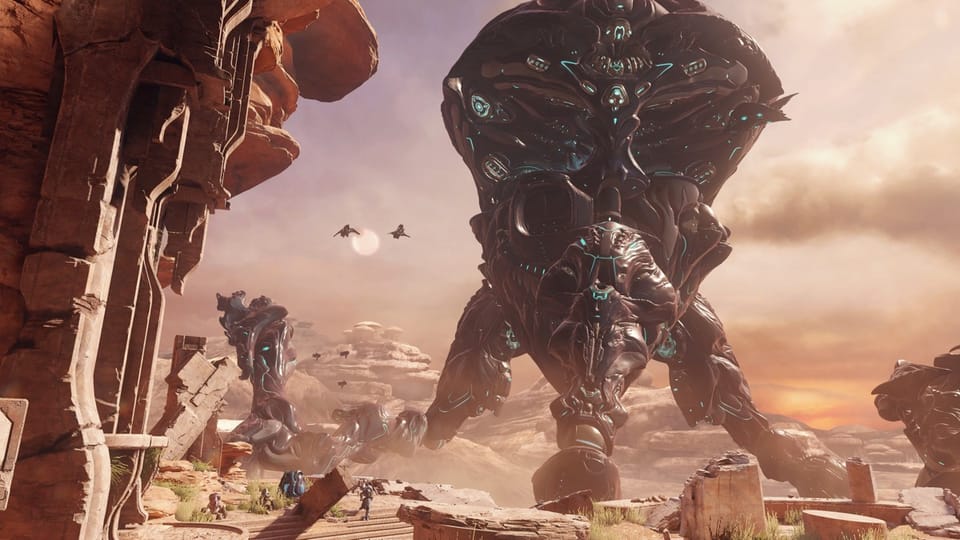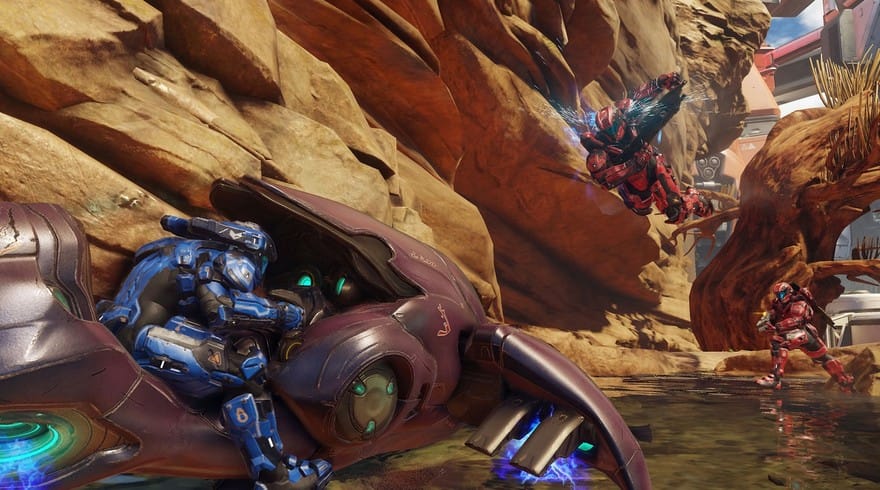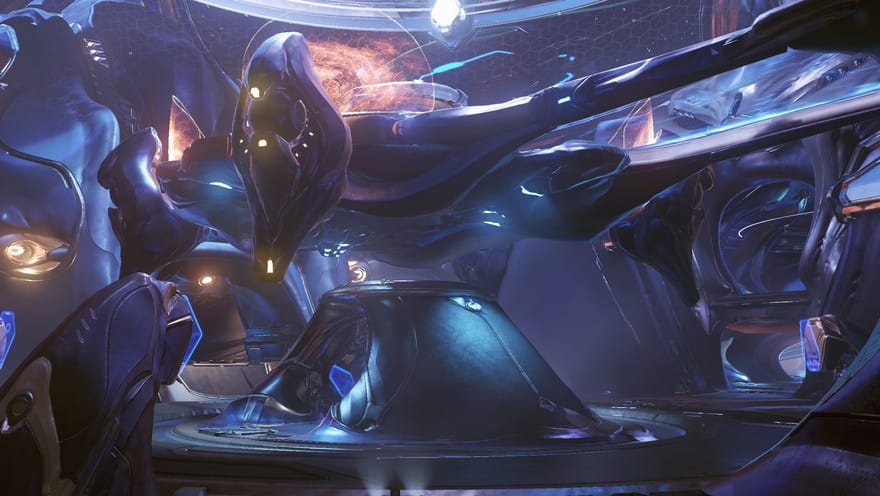Halo 5: A cooperative review

Like our insightful reviews? Back our Kickstarter so we can do it better and bigger!
Clayton Purdom and Eric Sams have played every Halo game together as it was released. Much of this was because they were in puberty at the time and there wasn’t much else to do, besides drink. They are now both happily married adults, but that didn’t seem like a reason to stop the streak.
///
Clayton Purdom (CP): Hey Eric, remember when we rode the space elevator into the sky? It was certainly a moment, the types of which Halo 5 strives to create. But was it a Halo Moment?
Eric Sams (ES): I would have to say “no, it was not,” and then I should also explain what the fuck we’re talking about. A “Halo Moment” is an abstract concept that goes beyond Halo, and is, in some ways, an emotion-based subjective experience that’s tough to define. But, for me, Halo Moments are those alchemical instants where the procedural rules of a game—things like physics and AI and blast radius—interact with a player’s actions in a way that creates the sensation that the thing that just happened is absolutely singular and unique. Those moments make the possibilities of the game, and by extension gaming, seem limitless. It could only have happened that one time, in that one game, and it only happened because it was you who was playing.
It doesn’t matter whether this is literally true. Obviously anything in a closed system is replicable, but that moment is still yours. In fact, the sense that you co-authored that moment with the game is a big part of what a Halo Moment is. Instead of diluting your sense of ownership, it somehow enhances it. In a fixed system, massive but fixed nonetheless, you are the variable that threw the grenade that flipped that Warthog onto that Grunt. So, no, riding the space elevator was a fun time, as riding anything called a space elevator would be, but it wasn’t a Halo Moment because the game’s contribution to it was entirely passive. It was just a nice videogame moment that happened in a Halo game.
A “Halo Moment” is an emotion-based subjective experience that’s tough to define
CP: Halo 5’s campaign still had “Halo Moments,” though. Like when I emerged out of a cave into a rainy morning, the sun’s light somehow thicker there than anywhere else, and I spent some twenty minutes picking off jackals guided only by the red in my reticle. You were off, like, looking for cave-walls to punch through at the time. At another point, in one of the game’s few large battlefields, I wide-assed my jeep right into a hotbed of aliens, who showered me in grenades, leading me to hop out of the jeep just as it exploded upward into the air, so I passed the time while it spiralled through the sky by punching aliens square in the kisser, and then hopped back into my jeep after it landed miraculously upright and tore ass back to safety. Its hood was on fire and I was almost dead, but I made it. I was breathing. I believe you were off looking for a turret to tote around uselessly while this miracle occurred. Still, this is the stuff on which friendships are built.
ES: I pride myself on my ability to read textures in videogames, and you know this. Nary a red barrel escapes unexploded when I’m playing a game. Even in survival horror, I will straight up spend one of my precious shotgun shells on a funny-looking wall if I think there might be something, anything, behind it. So, yeah, I was probably punching through walls while you were out there Sergeant York-ing around. Also, turrets are like guns but bigger. I’m not sure why I keep having to explain this to you.
But, yeah, I noticed some “Halo Moments” in Halo 5, too, though they have changed some over the years. One of my original Halo Moments was you and I frolicking in the very first meadow of the very first level of the very first game, tittering as we shot each other in the head, beat each other to death, blew each other up with grenades, and joyfully desecrated each other’s corpses. Those dust ups were pointless, but there was something about how neither of us could consistently get the upper hand. We kept wondering how that was possible. They couldn’t have balanced this interaction intentionally, could they? They couldn’t have foreseen us, hunched over controllers in a freezing Ohio dorm room, getting drunk and stalwartly refusing to just get on with the mission already.
Could they?

I think the answer is actually “no,” but the reason we got that feeling is more impressive than any conscious plan for those deathmatches/circle jerks. I think Bungie set up a world—built of environments and physics and areas of effect and damage ratios—and the invisible moving parts of that world were so tightly orchestrated, so fine-tuned, so perfectly enmeshed that it didn’t matter what players chose to do within it. You could move dutifully toward your next checkpoint, or prance around with your friend in the meadow, and the system would still work. You’d still feel that sense of ordered openness.
CP: That openness, though: it’s back, at least somewhat. Where the frequently sublime Halo: Reach and the shiny but totally forgettable Halo 4 moved closer and closer to the median average of all shooting games, Halo 5 is shockingly reactionary, full of hard 45-degree angles and slowly recharging shields. It’s not that the spaces are open again, but the interactions between people and enemies are more open. It’s Halo 3 again; it’s fucking around the morning after a house-party, punching and punching if you so choose, or needling an opponent furiously mid-afternoon. You grind up but not toward any real goal—just, up. The experience points you gain here are a measure of your time and nothing else. Halo 5 seems newly invested in the idea that that time is well spent; that it’s rich with narrative and incident, rather than merely reward.
When Halo 4 came out, you and I lived on opposite sides of the country, but even then I felt some weird pull to communalize the experience. A friend and I put our Xbox 360s in one room and invited a bunch of friends over on some weird LAN party shit. We sarcastically consumed Doritos and Mountain Dew until we became unsarcastically nauseous. A few months later, I was staying at your house on an outright business trip, but rather than like “go out to eat” we started picking through Halo 4’s campaign again, too, on co-op. Old habits die hard. But in hindsight, that game feels like the end of a period of confusion for the series.
Halo 5 seems newly invested in the idea that your time is well spent
ES: I enjoyed ODST and Reach both, especially ODST, with it’s weirdly clean urban noir vibes (tenor sax music!) unlike anything in Halo before or since. But the multiplayer of Halo 4 did seem for a while like the last I’d ever play. It was a supremely odd sensation, putting the controller of my 360 down one night in January 2013 and thinking, “Okay, that’s done.” I wasn’t frustrated by it. I didn’t feel like I had completed anything or exhausted anything, I was just finished playing multiplayer. In a lot of ways, Halo 4 felt like the apex of some evolution that the series had been building toward since 2001; it was gorgeous, and sleek, and muscular, and the story hit its beats confidently, but it was not at all fulfilling. More damningly, it wasn’t fun. Playing through that campaign on Legendary was one of the least fun experiences I’ve ever had playing a videogame, and I’ve played every Halo campaign through on Legendary. Over and over again I had this galling sense of, “Okay, what now?” I worried that I had started to outgrow Halo, and that prospect really sucked.
What Halo 5 shows me, though, is that Halo was starting to outgrow me. Halo 4 required a level of skill and dedication that I, as a guy with a full-time job and a dog and stuff, just could not devote to it. That prospect sucked even more. But after literal years of beating my head against that same wall (“This will be the Halo multiplayer I’ll finally master. I’m gonna get soooo goo- fuck, who’s shooting me?!?”) I resigned myself to the fact that certain parts of gaming, even in the series in which I’ve spent the most time, just weren’t for me anymore.
CP: Which brings us, again, to Halo 5, and its space elevator. They just will not let up on the goddamn space elevator, and you and your scrappy crew of space marines will battle as one toward it, and then soar up it into the sky. The gang’s all there, Master Chief and his pals Linda and Kelly. (Were the names in this game drawn from a hat?) For the first time, though, the game is insistent upon community as an essential ingredient, both within the narrative and the game’s design—that you will not get to ride the space elevator if you do not do it as a team. You must gather your party before doing fucking anything. The story alternates between two sets of four totally inconsequential soldiers—Nathan Fillion gets the wisecracks, everyone else just talks about teamwork—whereas in previous games, you could play it cooperatively but the game would insist there was only one person doing it.

There was grousing before the game’s release that split-screen cooperative play, the type of which has been the bedrock of all of our Halo playing and indeed much of our friendship, would be axed. We could still play the game cooperatively, but we had to do it over the internet, with some sort of dorky-ass headset on. But instead it’s become the bedrock assumption of the game. Playing Halo by yourself is straight up non-canon.
There are a lot of reasons this is a pain in the ass, from a pragmatic viewpoint. You get home from work about an hour before I retire, scotch in hand, to my bedchamber. Playing through this campaign, we’ve both had the sort of occasional things to do, mostly involving basketball spectatorship, that humans sometimes have. On Legendary, the missions can be resolutely unfair, full of one-hit kills and seemingly endless reinforcements.
But here’s the thing: it also works really, really well, and a large part of this is because of, yes, Halo Moments. An interesting comparison could be drawn to Destiny, which Halo’s creators at Bungie have gone on to make, leaving the series to the stewardship of 343 Industries. Destiny, which is ostensibly a massively multiplayer game, is much more of a siloed eternal grind; when you play cooperatively, it’s just you and a pal or two, throwing bullets into the same bucket, rolling the dice for better weapons together. Its big moments are never wrought lazily out of a field; they’re all space elevators that you ride together. I have played a lot of Destiny with friends and with randomly assigned partners, but it’s sort of like being on a car ride together. Halo 5, on the other hand, is full of tense moments of planning and frustration and awe. The same multiplayer mode played in the same environment will never feel the same twice. Which begs the question: If a Halo Moment occurs and a friend isn’t there to tell about it, did it happen?
ES: The answer to that hovers somewhere on the dial between “just barely” and “not quite.” Halo Moments are like these spontaneous, one-time easter eggs folded into the layers of any lavishly enjoyable game. And the minutiae of this game is almost indescribably lavish. When you drop into a slide on a dead sprint, shields failing and HUD screaming at you in red, you will slide smoothly, and far enough to make it to cover. When you jump into the air, straight up, and fire your rocket boosters backward because you feel shots hitting you from behind, sometimes the boosters will blast you just far enough to land directly behind your enemy. As you initiate a brutally economical execution of that enemy a tingle will shoot down the length of your spine. And when you perfectly time that Spartan Charge through a destructible wall, well, I don’t think I have to tell you how special that moment is.
If a Halo Moment occurs and a friend isn’t there to tell about it, did it happen?
One quiet tradition in the Halo series is these moments when the developers hand you a weapon in the perfect environment to apply it, pat you on the back, and tell you, “Have fun.” A sense of careful orchestration is maybe never so palpable as when you happen across a DMR with a full clip (and a scope that zooms the exact perfect distance) and a rocket launcher just as the air in the vast open space beyond the next barrier explodes in blue light and dozens of Forerunners barrel out of invisible portals. You can feel the weapons in your hands, and when you raise them to fire you know the depth of their range within millimeters, you know the force of their stopping power, how many rounds it will take to drop that robot dog. The gunfeel in this game is so natural that you almost register the kick of the rifle stock against your shoulder. There is no dread in this moment. You don’t even brace yourself and worry quickly about your distance from your last checkpoint. You just find a tactically favorable little nook, maybe crouched behind the Spartan-sized wheel of one of those massive land movers, and start shooting while a smile dawns slowly across the features of your stupid face.
Like easter eggs or hidden rewards, Halo Moments are achievements to be shared, but the sense of community they evoke isn’t the sweaty-palmed cutthroat guild mentality of the sub-Reddit. That’s because you can’t read how to unlock a Halo Moment on some wiki, and, when they happen, it’s genuinely not important whether you uncovered it through luck or skill. Halo Moments are revelations of accidental mastery, happenstance perfection, the butterfly effect of a shock wave blooming out from the epicenter of a frag grenade. A grenade that only you could have thrown. It only matters that it happened, and that you and your friend, for a simultaneous second, remembered why it was you loved playing games in the first place.
///
For more about Kill Screen’s ratings system and review policy, click here.



